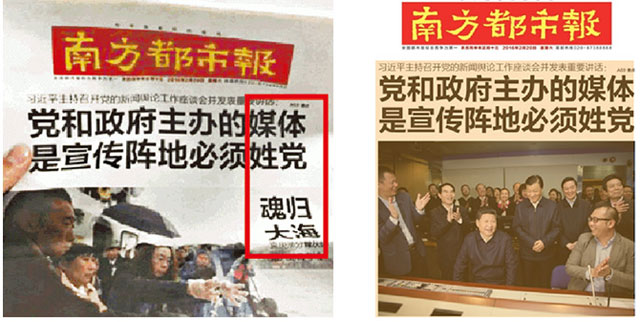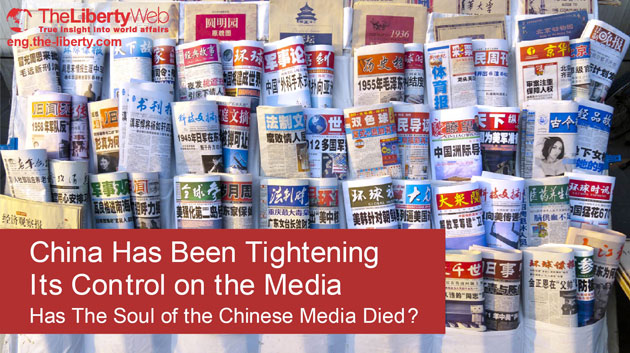China Has Been Tightening Its Control on the Media
Has The Soul of the Chinese Media Died?
The two headlines carrying a message that implicitly criticized President Xi Jinping’s tight media control appeared on the front page of the Shenzhen edition of Southern Metropolis Daily on February 20th. A female editor who wrote the headlines was fired.
The first headline said as follows: “The party and government run media are a propaganda front and must be surnamed ‘party.'” In other words, they must be obedient to the orders of the Chinese Communist Party.
At first glance, the headline did not seem to criticize Xi Jinping and the government.
However, below the first headline there was a photograph of people spreading at sea the ashes of a recently deceased senior Communist Party official. The short headline that accompanied the photo said: “The soul returns to the sea.”
If the last two characters of each line in those two headlines were read vertically, they could read as follows:
“The media whose surname is party
Its soul returns to the sea.”
The message could be understood to mean “the death of the Chinese media’s soul.”

(The photo on the left) The front page of the Feb.20th issue of Southern Metropolis Daily
The characters circled in red could be construed as “the death of the Chinese media’s soul.” (The photo was provided by Bowen Press)
(Photo on the right) The electronic version of the Feb. 20th issue of Southern Metropolis Daily The photo has been changed.
The headlines were considered to be criticism of Xi Jinping’s tightening control of the media, which came to an issue online in China.
Xi Jinping Demands Absolute Loyalty from the Chinese State Media
The Chinese government is stepping up its control on the media to suppress such criticism.
The headlines came one day after Xi Jinping made an inspection tour of three major state media outlets including the People’s Daily, Xinhua news agency and China Central Television (CCTV), which was quite unusual.
During the tour, CCTV welcomed Xi with an electronic message which stated, “CCTV’s surname is ‘the party.’ We are absolutely loyal, ready for your inspection.”
This message took heat from people on the Internet, but the Chinese government deleted all those criticisms.
Moreover, in late February, China shut down the micro blogging accounts of Mr. Ren Zhiqiang, a former property tycoon. Mr. Ren had more than 37 million online followers.
His account was shut down because on his micro blog called Weibo, he criticized Xi’s inspection tour, saying, “Once all the media is part of one family and stops representing the interests of the people, then the people will be cast aside and forgotten.” Other popular micro blogging accounts with several to 20 million followers were shut down.
Will a Fight for Freedom Take Place?
According to some news reports, President Xi is expanding control over the media out of frustration. They say that due to obvious decline in popular support, he is trying to fabricate that he has support from the public using the state-run media.
Nonetheless, there are growing calls among people for freedom of speech in China. The headlines implicate that the Chinese people are making a desperate effort to get around the censorship to criticize the government.
On the surface, the souls of the Chinese media might have died, but the souls of the Chinese journalists are not dead yet.
The Struggle for freedom seems to be taking place among the Chinese people, which means that the seeds that will change the Chinese political system are beginning to sprout. We must not hesitate to provide support to the Chinese people who are crying for freedom, not to mention people in Hong Kong and Taiwan.


![The Laws of Justice: How We Can Solve World Conflicts and Bring Peace [Paperback] by Ryuho Okawa/Buy from amazon.com](/files/2016/07/160707_amazon.jpg)

















